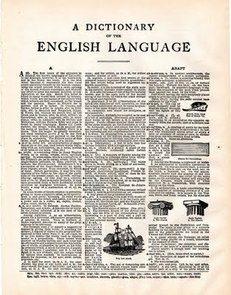General Resources
Here you will find useful tools that can help you in many different courses. You will find personal dictionaries, graphic organizers plus many other interesting ways of enhancing your learning in English while studying other courses.
How to Learn English
You've probably heard it before, but it is very, very true. Practice makes perfect. Click here for a link to a website that gives you tips on how to learn English, including how to improve INput (Listening and Reading) and OUTput skills (Speaking and Writing).
Vocabulary building
Here are some useful tools to increase your vocabulary in content areas.
|
Frayer DiagramsThese are graphic organizers that help you learn words quickly and thoroughly. By using a picture, symbol or illustration you are more likely to remember the word in the future. By putting the word into a sentence of your own, you will be gradually making that word a part of your everyday vocabulary!
The first one is a full page diagram - to use with very important words. If you have a number of vocabulary words to study, you may want to use the second file, which has many diagrams on one page. | ||||||||||||
|
Personal Dictionary PagesThese pages help you keep track of the words you need to know for your courses. By keeping a personal dictionary you can focus on the words that appear often. You can organize your vocabulary by class or alphabetically.
| ||||||
Online Visual DictionaryClick here for a very useful website that has a visual dictionary organized by theme! Learn challenging vocabulary by simply looking! There are also games you can play to increase your English knowledge!
|
A tip for paper dictionary use...
|
Learn Prefixes and Suffixes...
Words in English are based on parts of words from other languages, many from latin. These parts of words are used in thousands of words. Once you know approximately what they mean, you can guess the meaning of many words!
Click here for a website that lists many prefixes, roots and suffixes. These word parts will be especially helpful in increasing your academic vocabulary!
Wikipedia also has a useful page of prefixes, roots and suffixes organized alphabetically which may be very useful for you. Check it out here.
Click here for a website that lists many prefixes, roots and suffixes. These word parts will be especially helpful in increasing your academic vocabulary!
Wikipedia also has a useful page of prefixes, roots and suffixes organized alphabetically which may be very useful for you. Check it out here.
Words Often Confused
Here is a website that alphabetically lists words that are often confused by native English speakers! No wonder English is so hard! This website is organized alphabetically and could be helpful in making sure you write what you mean! Unfortunately, the words are not organized by difficulty so this will be easier if you are looking for a specific word.
Homophones
Homophones are words that are often confused because they sound the same.
What is the question telling you to do?
Sometimes it's hard to understand what a question really means. There are certain words that give you hints. These are called signal words. The following document helps you figure out the question and the English structures that will help you answer it.
|
This probably one of the most helpful tools you will find here. Print a copy for yourself and keep it handy. You will probably use it frequently.
| ||||||
Bilingual glossaries
Here is a link to a page that has many bilingual glossaries for different subjects. There are many languages here! This is from an American school district so not all of the words will be the same as we use but it can be very useful for you!
Academic Words
A researcher in Australia (Averil Coxhead) studied the most used words in English Language textbooks and came up with a big list. Most students struggle with these words, because many are about ideas instead of things. If you learn these words, you will be more successful in all of your academic courses.
List 1 has the most common words. Start here to learn the words and be more successful.
List 1 has the most common words. Start here to learn the words and be more successful.
|
Your key to 3000 words
This list has all of the words in alphabetical order with a definition that you can click. |
The Academic List in partsAcademic Word List 1 has the most used words (which means the most important to learn soon!).
|
Quizzes and games to see how well you know the words.Click the button to get to the website and click the tabs (A1, A2, etc.) on the top to try different practice activities.
|


